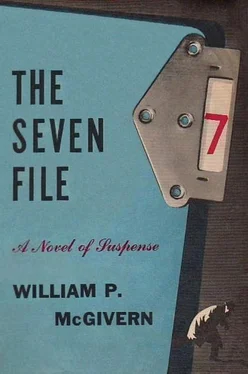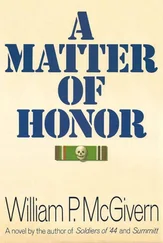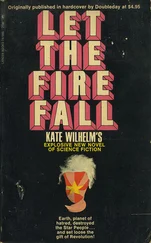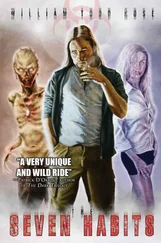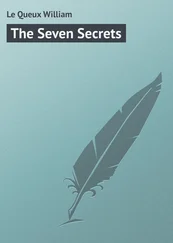William McGivern - The Seven File
Здесь есть возможность читать онлайн «William McGivern - The Seven File» весь текст электронной книги совершенно бесплатно (целиком полную версию без сокращений). В некоторых случаях можно слушать аудио, скачать через торрент в формате fb2 и присутствует краткое содержание. Город: New York, Год выпуска: 1956, Издательство: Dodd, Mead & Company, Жанр: Криминальный детектив, на английском языке. Описание произведения, (предисловие) а так же отзывы посетителей доступны на портале библиотеки ЛибКат.
- Название:The Seven File
- Автор:
- Издательство:Dodd, Mead & Company
- Жанр:
- Год:1956
- Город:New York
- ISBN:нет данных
- Рейтинг книги:4 / 5. Голосов: 1
-
Избранное:Добавить в избранное
- Отзывы:
-
Ваша оценка:
- 80
- 1
- 2
- 3
- 4
- 5
The Seven File: краткое содержание, описание и аннотация
Предлагаем к чтению аннотацию, описание, краткое содержание или предисловие (зависит от того, что написал сам автор книги «The Seven File»). Если вы не нашли необходимую информацию о книге — напишите в комментариях, мы постараемся отыскать её.
The Seven File — читать онлайн бесплатно полную книгу (весь текст) целиком
Ниже представлен текст книги, разбитый по страницам. Система сохранения места последней прочитанной страницы, позволяет с удобством читать онлайн бесплатно книгу «The Seven File», без необходимости каждый раз заново искать на чём Вы остановились. Поставьте закладку, и сможете в любой момент перейти на страницу, на которой закончили чтение.
Интервал:
Закладка:
“Nothing, sir,” the agent said.
Nothing, West thought. And this was Monday night. The baby had been gone since Friday night. Seventy-two hours. And they had nothing yet. Washington had been working all day on the print Crowley had found in the Bradleys’ study. So far, no luck. And no leads had developed from the Bradleys’ friends and business associates, nothing from the tradespeople in the neighborhood. Blanks everywhere, he thought. But in spite of this, he was developing a feeling about the case — a bad one. They couldn’t hope that the kidnapers would bring the baby back home. Because that wasn’t the kidnapers’ plan...
In Washington, fifteen fingerprint examiners had been working ten hours on the print Crowley had lifted from the Bradleys’ study. They had a frame of reference in which to work — their hypothesis being that the print belonged to a man whose nickname was Duke. Photographic enlargements had been made of the latent print, and from the criminal file jackets had been pulled on every individual nicknamed “Duke”; there were 1603 such individuals, and each of their cards had to be checked against the print found in Bradley’s study. There was some elimination; the latent print was a loop category, and so it wasn’t necessary to examine minutely all the whorls and arches. The job was, nevertheless, immense, and there were no short cuts. Fingerprints are counted and coded in sets of ten fingers — and such a set can be traced in a matter of minutes. But tracing a single print to its mate would mean examining each of the one hundred and twenty million prints in the bureau’s files — a job as difficult as tracing a leaf back to the twig it had blown from during a storm.
There was the chance that an identification could be made on the first card — but it might as easily be the last. Examiners worked steadily through the afternoon and evening, turning down card after card after failing to match them with the photographic enlargements which were propped up before their desks. Occasionally they stopped to rest their eyes, or take a quick drag on a cigarette, and then they resumed the patient, dogged search.
Finally a slender man with graying hair stood quickly and walked down the aisle to the supervisor who was in charge of the detail. “Here it is,” he said quietly. “Age thirty-one at time of last arrest. Served four years in Joliet for armed robbery and assault. Edward John Farrel, nicknamed ‘Duke.’ ”
The supervisor looked at the dark, bold front face and profile shots of Duke Farrel. Then he nodded and said, “I’ll call Inspector West. Get this card over to him by wire photo. I hope this does it...”
Seventeen
On spring evenings darkness settled with disquieting suddenness about the lodge. There was no softly shadowed dusk to foretell the end of day; reflections from the tidal river preserved the illusion of daylight for a time, but when they disappeared, winking out abruptly, the night rushed in to rill up the vacuum.
Duke stood at the window with his hands in his pockets, and Grant was at the fire, looking through a newspaper. A single lamp and the leaping flames provided the only illumination in the room. The comers were dark, and giant shadows moved on the white ceiling as Grant flipped over the pages of his paper.
Hank sat at the piano, occasionally brushing the keys with his left hand. The pain had started again in his right, and a heavy pulse beat like a hammer against the shattered bone.
There had been very little conversation since dinner. The mood in the house was tense and wary; as the climax approached, nerves were tightening painfully. And there was still a day to go, a full twenty-four hours, Hank thought.
He touched a key and Grant looked over his paper at him. “You play that thing?”
Hank shook his head. “Just pick out the tunes.”
“Then what’s it here for?”
“The owner threw it in with the deal when I bought the place.”
Without turning Duke said dryly, “He’d have to throw in a band and a chorus line to get me interested.”
Hank began picking out Swanee River with one finger and Grant shook his head and blew a stream of smoke at the ceiling.
“Too jazzy?” Hank said.
“No, it’s just great,” Grant said with heavy sarcasm.
“How’s the wood situation?” Duke said.
“It looks all right.”
“Looks all right? I see three logs.”
“That should get us by.”
“And if it doesn’t I can always lug in some more, I guess.”
“Don’t be a martyr,” Grant said. “I’ll get the wood. But you were the guy brought up by Indians. I thought you’d love playing Boy Scout up here.”
Duke didn’t answer him. His head was tilted slightly toward the piano. “What are you playing that for?”
Hank had drifted to another melody without realizing it. And it took him a second or two to identify it. The Kerry Dancers, he thought. That wasn’t quite right, but it was close. “It’s a nice old song,” he said.
“Yeah, nice and dismal,” Duke said. He frowned slightly, then shook his head and walked to the mantel to pour himself a drink. “You take your kicks real square.” Hank was trying to remember the words as he picked out the tune with one finger. A phrase or two came back to him, poignant and bitter-sweet with the mystery of loss: Gone, alas... all those hours of gladness, Gone, alas! like our youth too soon.
This song had had a curious significance in their home, he remembered. But why? No one in the family was musical. Where would they hear it? On the radio occasionally... And when that happened his father had become pensive. Not sad, but thoughtful. And his mother would ask him who had been in the store that day (or something equally chattery), and prod him into a different mood.
Hank started the song again, trying to puzzle out its significance. He was quite sure he hadn’t been aware of his parents’ reaction to it when he was young; he had absorbed his impression unconsciously. And now he was dredging it up... but why? Then, glancing at Duke’s back, he thought he knew the answer to that question.
The room was very still. Hank played softly, and the notes of the sad old song fell with a haunting charity into the silence. “She liked this, I guess,” he said.
“Who?” Duke didn’t turn but Hank heard the surprise in his voice.
“Your mother.”
“Yeah? Who told you that?”
“I forget.” Hank picked out the tune with slow insistence. “She was young when she died, wasn’t she?”
Duke turned slowly. He stared at his brother for a few seconds, and then made an awkward little gesture with his hand. “I don’t know, twenty-eight, twenty-nine, something j like that.”
“You were only about seven, I guess. Do you remember her?”
“Sure, I remember her. At seven you remember things. You think seven year old kids are still in the cradle?”
“I never saw a picture of her,” Hank said. “There weren’t any in the house. Funny.”
“What’s funny? We moved around a lot. I mean before the old man married again.” Duke made another awkward gesture with his hand; he seemed suddenly defensive and vulnerable. “Things kept getting lost. You know how it is.”
“Sure, that’s the way it goes,” Hank said. And then he thought of the scar on his forehead. The picture had reminded him of it. That had happened when he was very young, four or five at the most. He had been poking around in Duke’s drawer, and had come across a small photograph wrapped in tissue paper. He hadn’t removed the picture — only looked at the faint image he could discern through the filmy wrappings. And then Duke had come in, noiselessly as always, and caught him. What had he hit him with? A tennis racket, that was it. The first thing he had picked up...
Читать дальшеИнтервал:
Закладка:
Похожие книги на «The Seven File»
Представляем Вашему вниманию похожие книги на «The Seven File» списком для выбора. Мы отобрали схожую по названию и смыслу литературу в надежде предоставить читателям больше вариантов отыскать новые, интересные, ещё непрочитанные произведения.
Обсуждение, отзывы о книге «The Seven File» и просто собственные мнения читателей. Оставьте ваши комментарии, напишите, что Вы думаете о произведении, его смысле или главных героях. Укажите что конкретно понравилось, а что нет, и почему Вы так считаете.
